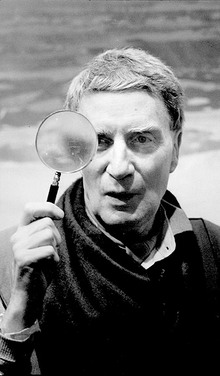Brion Gysin
| Brion Gysin | |
|---|---|
 |
|
| Born | John Clifford Brian Gysin 19 January 1916 Taplow, England |
| Died | 13 July 1986 (aged 70) Paris, France |
| Occupation | painter, writer, poet |
| Nationality | British/Canadian |
| Literary movement | Beat, Postmodern |
Brion Gysin (19 January 1916 – 13 July 1986) was a painter, writer, sound poet, and performance artist born in Taplow, Buckinghamshire.
He is best known for his discovery of the cut-up technique, used by his friend, the novelist William S. Burroughs. With the engineer Ian Sommerville he invented the Dreamachine, a flicker device designed as an art object to be viewed with the eyes closed. It was in painting and drawing, however, that Gysin devoted his greatest efforts, creating calligraphic works inspired by the cursive Japanese "grass" script and Arabic script. Burroughs later stated that "Brion Gysin was the only man I ever respected."
John Clifford Brian Gysin was born at the Canadian military hospital in the grounds of Cliveden, Taplow, England. His mother, Stella Margaret Martin, was a Canadian from Deseronto, Ontario. His father, Leonard Gysin, a captain with the Canadian Expeditionary Force, was killed in action eight months after his son's birth. Stella returned to Canada and settled in Edmonton, Alberta where her son became "the only Catholic day-boy at an Anglican boarding school". Graduating at fifteen, Gysin was sent to Downside School in Stratton-on-the-Fosse, near Bath, Somerset in England, a prestigious college run by the Benedictines and known as "the Eton of Catholic public schools". Despite, or because of, attending a Catholic school, Gysin became an atheist.
...
Wikipedia
